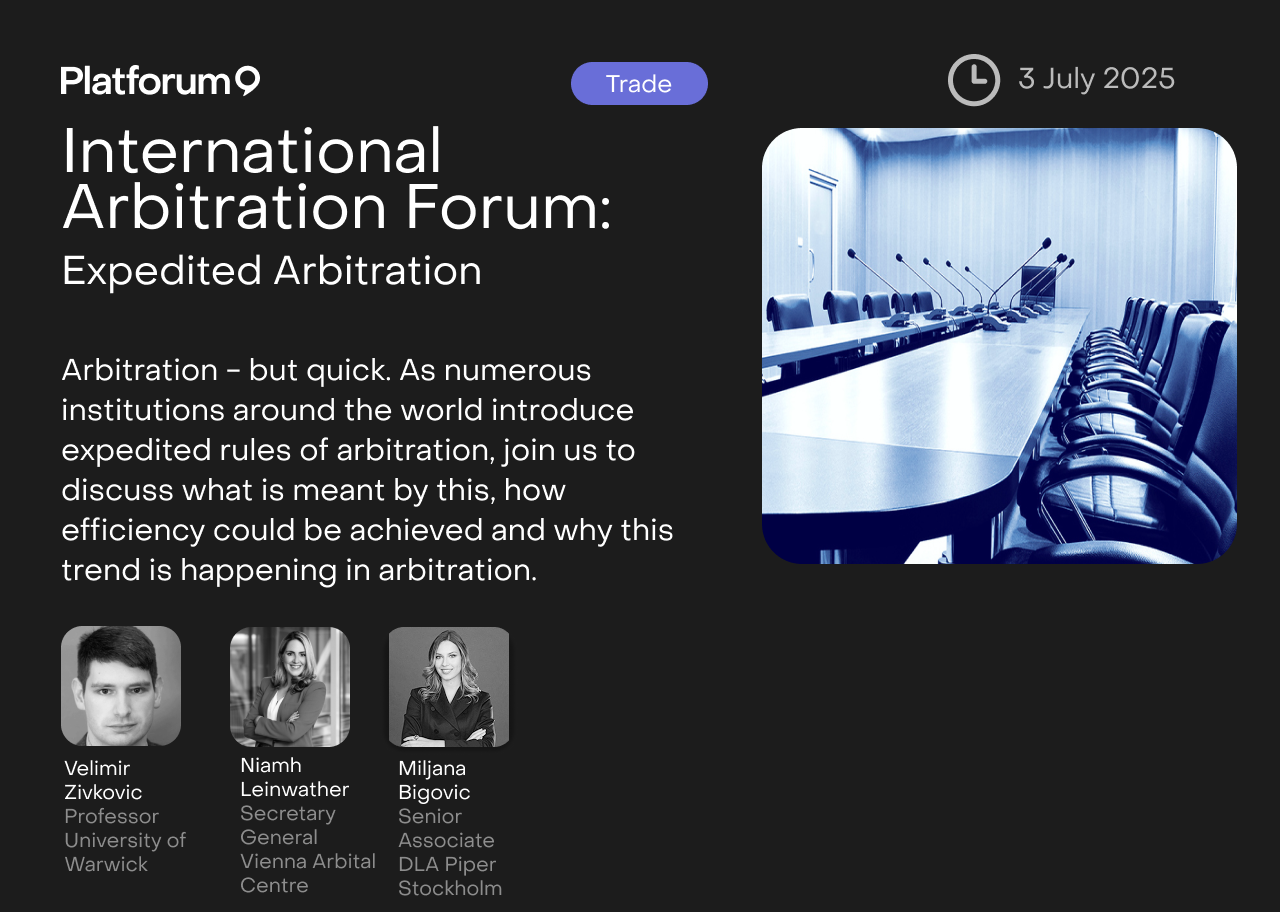Insights from Leading Practitioners
Leading arbitration practitioners explored the evolution and practical application of expedited arbitration procedures. The discussion was led by moderators Velimir Živković from Warwick Law, alongside Niamh Leinwather from the Vienna International Arbitral Centre (VIAC) and Miljana Bigović from DLA Piper in Stockholm. Drawing from their extensive experience across different jurisdictions and perspectives, they offered candid insights into when expedited arbitration works, when it doesn’t, and where the field is heading.
The Fundamental Paradox: Why Expedite the Expeditious?
Živković opened the session by posing a provocative question: if arbitration was designed to be expeditious, why do we need expedited arbitration? This apparent paradox reveals a deeper tension in modern dispute resolution.
Leinwather addressed this head-on, acknowledging that whilst arbitration advocates champion its efficiency, the process sometimes suffers from perceptions of being costly and time-consuming. Referencing the Queen Mary survey on International Arbitration, she noted that 65% of users employ expedited rules to minimise costs, whilst 58% seek more rapid resolution, particularly for lower-value and less complex cases.
“We need it for those cases that don’t require a huge amount of in-depth deep diving,” Leinwather explained, emphasising that expedited procedures serve disputes that may be quite simple but would face lengthy delays in traditional court systems.
The Copy-Paste Reality of Legal Disputes
Bigović provided crucial perspective from the law firm trenches, highlighting a reality often overlooked by theorists: expedited arbitration requires truly cooperative parties to be effective. She observed that whilst parties often focus on administrative costs, they frequently fail to connect how procedural choices directly impact legal fees.
“It has happened to us in the past that expedited processes, despite sticking to very strict timelines, we would still charge as much as in a regular process,” Bigović noted, underscoring that speed doesn’t automatically translate to cost savings without strategic case management.
Her insight reveals a fundamental truth: success in expedited proceedings requires front-loading evidence and arguments, strategic witness selection, and careful arbitrator choice based on efficiency rather than just reputation.
Institutional Innovation and Statistics
The discussion revealed fascinating differences in institutional approaches. Leinwather explained that VIAC employs an opt-in system under Article 45, resulting in only 8% of cases using expedited procedures despite 50% involving disputes under half a million euros. This low uptake often stems from respondents’ reluctance to agree to expedited proceedings.
The Value Versus Complexity Misconception
One of the session’s most important insights challenged a persistent misconception in the field. Živković emphasised that dispute value doesn’t correlate with complexity: “I’ve been involved with some fairly low value arbitrations which raised extremely interesting and complex legal questions, and vice versa.”
This observation strikes at the heart of how parties and institutions should approach expedited procedures. Rather than relying solely on monetary thresholds, the decision should consider the actual complexity of legal and factual issues involved.
Real-World Lessons and Cautionary Tales
The conversation included sobering real-world examples. Bigović shared a cautionary tale from ICC construction arbitration where expedited rules were applied to a complex dispute, resulting in a rushed award containing clerical errors regarding the seat of arbitration—errors that neither the parties nor the institution caught during scrutiny.
“Maybe this rush ends up not giving satisfying results because of the time pressure that institutions put on arbitrators,” Bigović observed, highlighting the potential downside of compressed timelines.
Leinwather responded by acknowledging institutional responsibility: “I do see that very much as our role as an institution to make sure that if we appoint arbitrators, they’re delivering the service we would want them to, and that they’re delivering on time.”
The Future of Expedited Procedures
Looking forward, Leinwather referenced UNCITRAL model clauses on specialised express dispute resolution, suggesting continued evolution in the field. However, she emphasised that excellent tribunals already employ efficiency tools regardless of formal expedited rules.
“If you have an excellent tribunal, they will already use different types of tools available to them, whether it’s a midstream conference or preliminary views,” she noted, suggesting that arbitrator quality matters more than procedural frameworks.
The Flexibility Factor
A key theme emerged around flexibility—the ability to transform proceedings from expedited to standard when circumstances warrant. This adaptability appears crucial for encouraging parties to initially opt for expedited procedures, knowing they can adjust if complexity emerges.
Živković highlighted successful examples like the Court of Arbitration for Sport, which operates with sole arbitrators, compressed timelines, and decisions ex aequo et bono, proving that expedited procedures can work when properly designed for their context.
Audience Engagement and Core Questions
The session included thoughtful audience participation, including Franklin’s challenging question about whether expedited arbitration represents an admission that standard arbitration is failing. Leinwather firmly rejected this characterisation: “I don’t think the process is failing. It’s simply a one size doesn’t fit all situation.”
This exchange crystallised the session’s central insight: different disputes require different approaches. Complex construction arbitrations with multiple experts cannot reasonably be expedited, whilst straightforward commercial disputes benefit from streamlined procedures.
Conclusion: Matching Process to Purpose
The discussion concluded that expedited arbitration serves a vital role when properly applied. Success depends on appropriate case selection, cooperative parties, efficient arbitrators, and institutional support that includes flexibility to adjust course when needed.
Rather than viewing expedited procedures as a remedy for systemic failure, they should be understood as a tailored solution for specific dispute types. The future lies not in choosing between expedited and standard arbitration, but in matching the right process to the right dispute—something that requires collaboration between parties, counsel, and institutions to achieve optimal outcomes.




